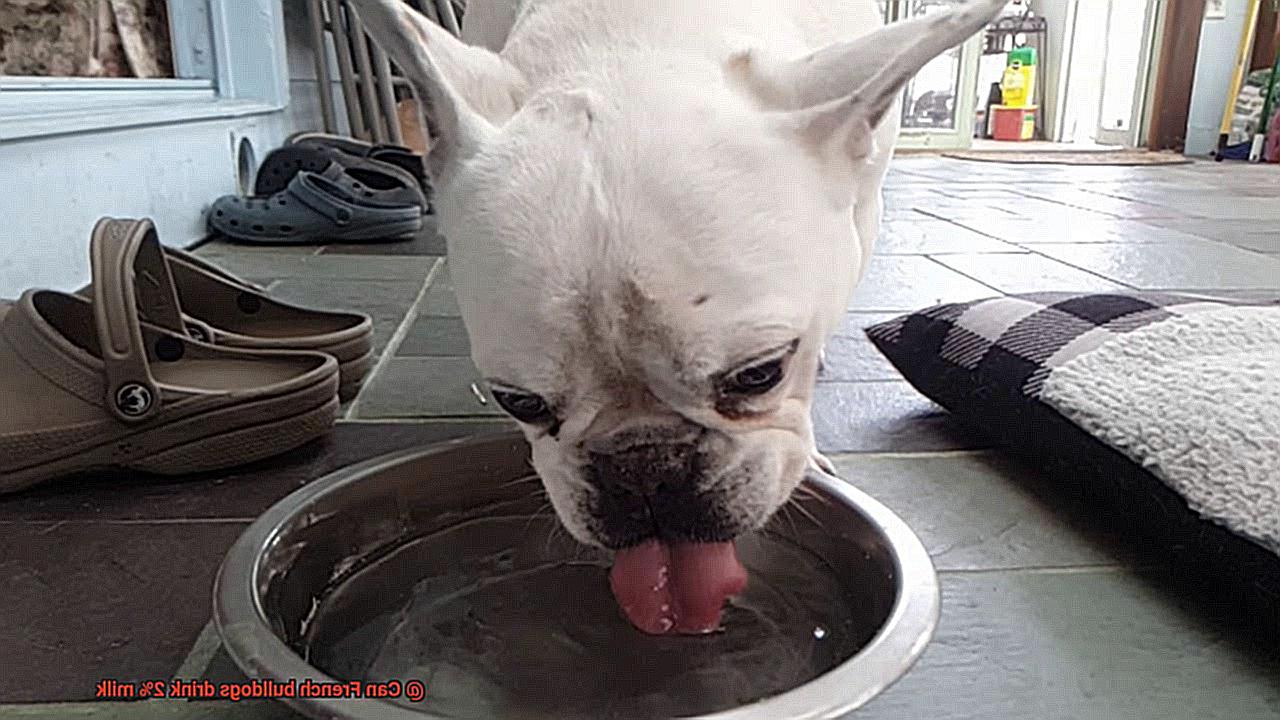Can French bulldogs drink 2% milk?
French bulldogs, those adorable little troublemakers that steal our hearts with their antics. We want nothing but the best for them – from their toys to their treats and especially their food. But when it comes to what they can and can’t consume, things can get a bit confusing.
Today, we’re diving into a burning question that has puzzled many Frenchie enthusiasts: can these lovable pups enjoy a sip of 2% milk? In this blog post, we’ll unravel the mysteries behind lactose intolerance in dogs, explore the potential benefits of milk, and ultimately determine whether our furry friends can safely indulge in this creamy delight. So grab your drink of choice and let’s settle this dairy dilemma once and for all.
Exploring the Lactose Intolerance of French Bulldogs
Contents
- 1 Exploring the Lactose Intolerance of French Bulldogs
- 2 The Higher Fat Content of 2% Milk
- 3 Nutritional Requirements for French Bulldogs
- 4 Alternatives to 2% Milk for French Bulldogs
- 5 Advantages of Providing Dairy Products to French Bulldogs
- 6 Considerations When Choosing Dairy Products for Your Dog
- 7 The Risks Associated with Feeding Your French Bulldog 2% Milk
- 8 What Should You Feed Your French Bulldog Instead?
- 9 Conclusion
In this article, we will explore the lactose intolerance of French Bulldogs, its potential risks and complications, and provide you with alternative options to keep your furry friend healthy and happy.
Understanding Lactose Intolerance:
Lactose intolerance occurs when the body does not produce enough lactase, an enzyme needed to break down lactose – the sugar found in milk and dairy products. When a French Bulldog with lactose intolerance consumes milk, they may experience symptoms such as diarrhea, gas, bloating, stomach discomfort, and even vomiting.
Prevalence of Lactose Intolerance in French Bulldogs:
While there is limited specific research on lactose intolerance in French Bulldogs, it is believed that many dogs, including this breed, can have some degree of lactose intolerance. Since dogs do not have a natural need for milk after being weaned from their mother’s milk, their bodies may not produce enough lactase to digest milk properly.
The Risks of Feeding 2% Milk to French Bulldogs:
French Bulldogs should avoid consuming any type of milk, including 2% milk. Even though 2% milk has a lower fat content compared to whole milk, it still contains lactose, which can cause digestive issues for lactose-intolerant dogs. The higher fat content in 2% milk can also contribute to weight gain and potential obesity in French Bulldogs.
Alternatives to Milk for French Bulldogs:
To ensure that your French Bulldog receives proper hydration and nutrition without the risk of digestive issues, it is best to provide alternative options. Lactose-free milk specifically formulated for dogs is a great choice. Additionally, there are many dog-friendly beverages available on the market that meet the nutritional needs of dogs without causing any digestive discomfort.
Consulting a Veterinarian:
If you suspect that your French Bulldog may be lactose intolerant or has shown symptoms after consuming milk, it is essential to consult with a veterinarian. They can perform tests to determine the level of lactose intolerance and provide specific dietary recommendations to keep your dog healthy and happy.
The Higher Fat Content of 2% Milk
French bulldogs are beloved pets known for their adorable appearance and playful personalities. As a responsible pet owner, it’s essential to be aware of the potential risks associated with feeding certain foods, including 2% milk. In this article, we’ll explore the higher fat content of 2% milk and its impact on French bulldogs’ health. Let’s dive in.
Understanding the Fat Content in Milk:
Milk contains varying levels of fat, ranging from whole milk with around 3.25% fat to skim milk with virtually no fat. 2% milk falls in between, containing approximately 2% fat. While fat is an essential nutrient for dogs, moderation is key to prevent health issues.
The Importance of a Balanced Diet for French Bulldogs:
French bulldogs, like any other breed, have specific dietary needs. They are prone to obesity and gastrointestinal issues, making their diet crucial for their overall well-being. Consulting with a veterinarian can help determine the appropriate diet for your furry friend.
Can French Bulldogs Drink 2% Milk?

In general, it is not recommended to offer 2% milk or any dairy products to French bulldogs. Dogs, including French bulldogs, often struggle to digest lactose, the sugar present in milk, due to the lack of the enzyme lactase. This can lead to digestive upset and discomfort.
Potential Risks of Feeding 2% Milk to French Bulldogs:

Feeding 2% milk to French bulldogs can contribute to weight gain and obesity due to its higher fat content. Additionally, lactose intolerance can cause digestive issues such as flatulence and loose stools.
Alternatives to Milk for French Bulldogs:
Instead of offering 2% milk, consider alternative options that provide similar nutritional benefits without the potential risks. Water is always the best hydrating option for dogs. If you’re looking for a milk-like treat, lactose-free dog milk replacers are available, mimicking the nutritional profile of mother’s milk.
Nutritional Requirements for French Bulldogs
We all know that our adorable little pups deserve the best when it comes to their health and happiness. And one of the key aspects of their well-being is their diet. Today, we’re diving into the nutritional requirements for French Bulldogs to help you keep your Frenchie fit and fabulous.
Protein Powerhouse
First up, let’s talk protein. Just like us, French Bulldogs need a good amount of protein to keep their muscles strong and their energy levels up. Lean meats like chicken, turkey, and beef are excellent choices to meet their protein needs. Just make sure to cook them thoroughly to avoid any potential bacterial contamination that could upset your pup’s tummy.
Carbs for Energy
Next on the menu, we have carbohydrates. These little powerhouses provide the fuel your Frenchie needs to keep zooming around the house or park. Opt for complex carbohydrates like whole grains (think brown rice and oats) and veggies (sweet potatoes, peas, carrots) over simple carbs like white rice or refined grains. The fiber in these complex carbs also aids in digestion, keeping your Frenchie’s tummy happy and healthy.
Healthy Fats
Fat is not the enemy. In fact, French Bulldogs need healthy fats in their diet too. Fats provide energy and help with the absorption of fat-soluble vitamins. Look for sources like fish oil or flaxseed oil, which are rich in omega-3 fatty acids. Avoid saturated fats found in processed foods or fatty cuts of meat, as they can lead to weight gain and other health issues.
Vitamins and Minerals Galore
French Bulldogs need a wide variety of vitamins and minerals to stay in tip-top shape. A balanced diet that includes a rainbow of fruits and veggies can provide these essential nutrients. However, be cautious of certain fruits and veggies that can be toxic to dogs. Grapes and raisins, for example, are a big no-no as they can cause kidney damage. When in doubt, consult your vet to ensure you’re feeding your Frenchie the right foods.
Hydration Station
Last but definitely not least, let’s not forget about the importance of water. Water is vital for all living beings, and French Bulldogs are no exception. Make sure your Frenchie has access to fresh and clean water at all times. Dehydration can lead to serious health problems, so keep that water bowl filled.
So there you have it, folks – the lowdown on the nutritional requirements for your French Bulldog. Remember, each Frenchie is unique, so it’s always a good idea to consult with your vet to tailor their diet to their specific needs. And don’t forget to steer clear of any human foods that could be harmful to your furry friend.
Alternatives to 2% Milk for French Bulldogs
French Bulldogs are known for their sensitive stomachs and can be prone to food allergies and intolerances. While some dogs may be able to tolerate small amounts of 2% milk without any negative effects, it is generally not recommended as a regular part of their diet. But don’t worry, there are plenty of delicious alternatives that can keep your furry friend happy and healthy.
- Lactose-free milk: This is a great option for French Bulldogs who enjoy the taste of milk but struggle with lactose intolerance. Lactose-free milk is treated with lactase, an enzyme that breaks down lactose, making it easier for dogs to digest.
- Goat’s milk: Goat’s milk is often used as an alternative to cow’s milk for dogs with allergies or sensitivities. It contains less lactose than cow’s milk and is generally easier for dogs to digest. Plus, it’s packed with beneficial nutrients like vitamins, minerals, and probiotics.
- Coconut milk: Dairy-free and rich in healthy fats, coconut milk can be a good choice for French Bulldogs. Make sure to choose unsweetened coconut milk without any added sugars or artificial sweeteners.
- Bone broth: A nutritious alternative to 2% milk, bone broth is made by simmering bones (such as chicken or beef) in water for an extended period of time. It’s a great source of hydration and can also support joint health in French Bulldogs.
- Dog-specific milk replacers: If you’re looking for a convenient option, there are commercially available dog-specific milk replacers. These products are formulated specifically for dogs and provide all the necessary nutrients they need.
Advantages of Providing Dairy Products to French Bulldogs
Today, we’re going to talk about the advantages of providing dairy products to our furry friends. From promoting healthy bone development to aiding digestion, dairy products can be a tasty and nutritious addition to your French Bulldog’s diet. Let’s dive in.
Strong Bones and Muscles:
Dairy products are a fantastic source of calcium and phosphorus, essential minerals for bone development and maintenance. French Bulldogs, especially during their growing stages, need these nutrients to support their sturdy frame. Additionally, the protein content in dairy products contributes to muscle development and repair, keeping those little bodies strong and active.

Happy Tummies with Probiotics:
Did you know that some dairy products, like yogurt, contain probiotics? These beneficial bacteria help maintain a healthy digestive system by balancing gut flora. For French Bulldogs prone to digestive issues like diarrhea or constipation, incorporating yogurt into their diet can work wonders. Just make sure it’s plain, unsweetened yogurt without any additives or artificial sweeteners.
Variety is the Spice of Life:
French Bulldogs can be picky eaters, but who can blame them when they’re offered the same old kibble day in and day out? Including dairy products in their diet adds variety and excitement to their meals. Mix in some cheese or add a dollop of yogurt as a special treat. Trust us; your Frenchie will thank you with wagging tails and slobbery kisses.
Essential Vitamins:
Dairy products are not only delicious but also packed with essential vitamins like vitamin D and vitamin B1Vitamin D aids in calcium absorption for strong bones, while vitamin B12 supports the nervous system and red blood cell production. By including dairy products in your French Bulldog’s diet, you’re ensuring they get the necessary vitamins for optimal health and well-being.
Remember: Moderation is Key.
While dairy products offer numerous benefits, it’s crucial to provide them in moderation. Some French Bulldogs may be lactose intolerant or have sensitive stomachs, which can lead to digestive upset. Always consult with your veterinarian before introducing new foods into your Frenchie’s diet.
Considerations When Choosing Dairy Products for Your Dog
French Bulldogs are adorable, lovable, and quirky little companions. As a proud French Bulldog owner myself, I understand the importance of providing them with a balanced and nutritious diet. When it comes to dairy products, there are a few considerations to keep in mind to ensure their health and happiness.
- Lactose Intolerance: French Bulldogs, like many other dogs, are lactose intolerant. This means that their bodies have difficulty digesting lactose, the sugar found in milk. Feeding them dairy products can lead to digestive issues such as gas, bloating, diarrhea, and stomach upset. It’s best to avoid giving your French Bulldog regular cow’s milk or other high-lactose dairy products.
- Low-Lactose Alternatives: Fortunately, there are alternative options that can provide similar nutritional benefits without the risk of digestive issues. Lactose-free or low-lactose milk alternatives such as almond milk, coconut milk, or oat milk can be great choices for French Bulldogs. These plant-based milks do not contain lactose and can be easier for dogs to digest.
- Nutritional Needs: French Bulldogs require a balanced diet that includes protein, fat, carbohydrates, vitamins, and minerals. When choosing dairy products or milk alternatives for your furry friend, make sure they provide essential nutrients such as calcium. Some milk alternatives are fortified with calcium and other important nutrients to support your dog’s overall health.
- Moderation is Key: While low-lactose milk alternatives can be a safer option for your French Bulldog, it’s important to remember that moderation is key. Milk or milk alternatives should not make up a significant portion of your dog’s diet and should only be given as an occasional treat. Too much milk, even if it is lactose-free, can still cause gastrointestinal issues in dogs.
- Consult with a Veterinarian: Every French Bulldog is unique, and their dietary needs may vary. Before making any changes to your dog’s diet or introducing new foods, it’s always a good idea to consult with a veterinarian. They can provide personalized advice based on your French Bulldog’s specific needs and health conditions.
The Risks Associated with Feeding Your French Bulldog 2% Milk
However, when it comes to feeding your French Bulldog 2% milk, you might want to think twice. In this blog post, we’ll dive into the risks associated with giving them dairy and explore safer alternatives to keep their tummies happy.

Sensitive Digestive Systems:
French Bulldogs are notorious for having sensitive digestive systems. Their dietary needs require careful consideration to avoid potential issues. One such concern is lactose intolerance.
Lactose Intolerance in French Bulldogs:
Like many adult dogs, French Bulldogs often struggle to digest lactose – a sugar found in milk. Feeding them 2% milk can lead to gastrointestinal upset, including unpleasant symptoms like diarrhea, vomiting, and gas. While some French Bulldogs may tolerate milk better than others, it’s generally recommended to steer clear of dairy products altogether.
More Severe Consequences:
In certain cases, feeding milk to French Bulldogs can have more serious consequences, such as pancreatitis or food allergies. These conditions can cause severe discomfort and may even require medical intervention. As responsible pet owners, it’s crucial to prioritize their health and well-being by avoiding risky food choices.
Safe Alternatives for Your Frenchie’s Treats:
Don’t fret. You can still indulge your French Bulldog with dairy-like treats without compromising their health. Lactose-free dog milk products are specially formulated for dogs and provide a safer option for those occasional creamy indulgences.

Introducing New Foods Gradually:
When introducing any new food into your French Bulldog’s diet, it’s important to do so gradually and in moderation. Monitoring their reaction closely will help you identify any potential issues early on. This rule applies not only to milk but also to any new addition to their menu.
Consult Your Veterinarian:
If you suspect that your French Bulldog has consumed 2% milk or any dairy product and is experiencing digestive issues, it’s always best to consult with your veterinarian for professional guidance. They can provide personalized advice based on your Frenchie’s specific needs.
What Should You Feed Your French Bulldog Instead?
You’ve got a French Bulldog and you want to make sure you’re feeding them the right things. Good news. I’m here to help guide you in the right direction. When it comes to feeding your furry friend, it’s important to remember that their nutritional needs are different from ours. While you might enjoy a glass of 2% milk, it’s not the best choice for your French Bulldog.
But don’t fret. There are plenty of alternative options that are not only safe but also nutritious for your pup. Let’s take a closer look at what you can feed your French Bulldog instead:
- Specially formulated dog milk replacers: If you’re looking for a milk substitute, these products are designed to provide all the necessary nutrients for puppies or dogs with special dietary needs. Simply mix the powder with water, and voila – a nourishing milk substitute.
- Plain yogurt: Yogurt is not only tasty but also a great source of probiotics, which can aid in digestion and promote a healthy gut. Just make sure to choose plain yogurt without any added sugars or artificial sweeteners.
- High-quality commercial dog foods: Look for dog foods specifically formulated for French Bulldogs. These foods are designed to meet their unique nutritional needs and often contain real meat as the primary ingredient. Avoid fillers and artificial additives.
- Specialized diets: French Bulldogs can be prone to allergies and sensitivities, so it’s important to consult with a veterinarian if you suspect any food intolerances. They can recommend a specialized diet that meets your dog’s specific needs.
Remember, hydration is key. Make sure your French Bulldog always has access to fresh and clean water. You can use a shallow bowl or even try a pet fountain to encourage them to drink more.
When it comes to feeding your French Bulldog, it’s always best to consult with a veterinarian or a canine nutritionist. They can provide tailored recommendations based on your dog’s specific needs. A healthy diet will not only keep your French Bulldog happy and energized but also support their overall health and well-being.
Conclusion
In conclusion, it is not recommended for French bulldogs to drink 2% milk.
While they may enjoy the taste, their digestive systems are not equipped to handle lactose properly. Consuming milk can lead to gastrointestinal issues such as diarrhea and upset stomach.
Remember, their health and well-being should always be a top priority.




